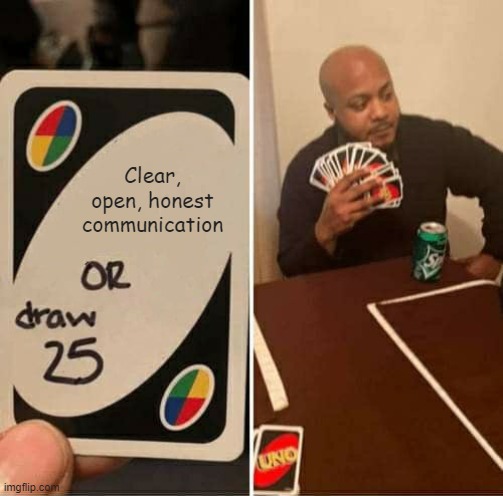
Tropes are tropes and clichés are clichés for a reason. When I facilitated poly discussion groups and moderated poly communities I would joke that the answer that will get everybody out of here in 15 minutes is, “have you tried clear, open, honest communication?”. Obviously that is not the answer a thousand percent of the time, but ninety percent of the time… it’s the answer. What can make something that seems so universal seem so difficult are internal struggles, mismatches in communication styles, and fixable habits.
Fear and Loathing in the Self
We spend a lot of time and energy in avoidance. Having hard conversations is called having hard conversations exactly because we are likely uncomfortable with exposing ourselves when we’re not sure we’ll be understood or supported. This is doubly difficult when we’re not sure ourselves how we identify, feel, or what we want. Internal questions such as, “should I come out?”, “am I even poly / swinger / LGBT+ ?”, “what if I lose them if I tell them?”, or “what if someone else finds out?” are common, and valid, concerns. The decision to come out, or how much to be out in different areas of life is deeply personal. The concern becomes when the self narrative becomes negative and feelings turn toward self anger and loss of hope. “Why was I born this way?”, “why can’t I just be happy”, and self name calling can be extremely dangerous for our mental health. People are meant to, well, people. We do better with good, supportive people around us. Whatever is wonderfully unique about you, your community is out here and they’re ready when you are. Some ways to work on self acceptance include:
- Changing the narrative and shush the inner critic. Some of us live with our own personal “Karen” in our head, belittling us and highlighting our challenges. Mindfulness practices and defusion techniques can help us quiet or tone down these gadflys.
- Celebrate your strengths and wins. Nobody wins everyday and many of us have more wins than we realize. People naturally notice the negative more easily. Begin looking for, or asking around, about strengths you have or accomplishments you have made.
- Speak to your best self. Imagine the best version of yourself. Would they let you talk to you that way? Probably not! How would your best self support you?
For some of us, coming to accept and love ourselves is the first step to being open and honest with ourselves. Then we can begin to be open and honest with others.
Being Multilingual in Love
Hopefully by now you’ve heard of the 5 Love Languages. Have you heard of attachment styles? Do we feel validated from praise, gifts, or time? Is our partner withdrawing because they have an anxious or avoidant attachment style? These can be great places to begin considering how you speak languages of love and how to hear the languages of others better. Here are some ideas to become fluent in your partner:
- Learn about their internal world. The better you understand your partner’s hopes, dreams, fears, values, and goals, the easier it can be to communicate. Asking open questions about their past or hopes for the future can be insightful!
- For some, face to face conversations can be intimidating. I’ve seen couples that prefer harder conversations to be through text or even shared online docs. One couple I knew outside of therapy shared a spiral notebook they used to write back and forth. This is the ultimate in “one person speaks at a time” technique. This allows them to receive their partner’s statements, react, then delete the horrible first reaction they came up with. Once they had good conversation with their best self, they (more) calmly wrote back. This distance from immediacy can be mucho importante.
- Watch the hands… and the rest of the body too. Body language can be a betrayer. If I’m on a coffee date, I look at heads, shoulders, knees, and toes. If more of these than not are pointed at me, that’s a good sign. If you see your partner’s body language is closed, tense, has shallow breathing, or is turning away it might be time to reset or take a breather.
Learn to Talk Gooder
Communication has 4 parts. What you think, what you say, what they hear, what they interpret. If any of these four parts gets garbled actual communication can fail.
- What you think. As mentioned earlier, the more clear and accepting you are of your own internal world, the easier communication can be. “To thine own self be true.” ~ Billy Shakespeare
- What you say. Many of us are not taught to speak our emotions well. I got you! The Emotion Wheel.
 There are many like this and most are pretty good. Using them to expand your vocabulary of emotions can help you express yourself better. One caveat, many list anger as a primal emotion. Many, myself included, believe anger is a secondary emotion. Feelings such as fear which are passive and feel negative usually fuel the active and empowering emotion of anger.
There are many like this and most are pretty good. Using them to expand your vocabulary of emotions can help you express yourself better. One caveat, many list anger as a primal emotion. Many, myself included, believe anger is a secondary emotion. Feelings such as fear which are passive and feel negative usually fuel the active and empowering emotion of anger.
- What they hear. Having a conversation under the propeller of a chinook helicopter is likely to create an extra level of frustration. Enunciate your words, make sure they’re paying attention, then speak your peace.
- How they interpret. Ultimately, this is not an aspect we can control. Each of us are the main character in our own life, supporting characters in others. We enter into people’s lives like the next part of a conversation that started well before we met, thus they carry their own filters and experiences to give context, or bias, to what they have heard. At times, people will outright interpret words that were spoken as entirely different from what they heard because they don’t match the expectation of what they would hear. Some people started having a bad day before you said hi. It may be best to allow for them to recenter, have some space, or have attention called to the misunderstanding.
These ideas are not exhaustive though they should be helpful. If you or someone you know would like help to be seen, heard, and accepted contact us below for a free 15 minute consultation.
